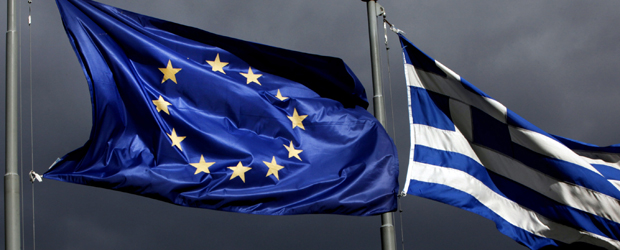Eurozone ministers drop Greece bailout meeting
Eurozone finance ministers drop plans for a face-to-face meeting about Greece’s new international bailout, saying party leaders in Athens have failed to provide the required commitment to reform.

Ministers have downgraded the talks to a telephone conference call, almost certainly killing off any chance they would approve a 130bn euro bailout which Greece needs by next month to avoid a messy bankruptcy.
The country has been hit by mass protests about planned austerity measures aimed at securing a bailout.
Ministers in the Eurogroup said Greece had failed to say how it would fill a 325m euro gap in budget cuts promised for 2012 and to persuade all party leaders to sign a commitment to implement austerity measures after an election expected in April.
A government source said late on Tuesday that Antonis Samaras, who will probably be the next prime minister, would sign the commitment on Wednesday morning – again running up against a deadline and infuriating EU leaders.
Samaras has criticised the measures, which parliament passed early on Monday as rioters wrecked buildings across central Athens. He says the cuts could plunge the country, already in its fifth year of recession, into an even bigger slump.
When parliament debated the austerity package on Sunday he indicated that he would try to renegotiate the terms of the bailout, increasing doubt in the minds of European leaders.
Read more: Endgame II - europe's Faustian past
“So far Samaras has not given a letter of commitment and this is a problem,” a source familiar with the bailout negotiations said on condition of anonymity.
Samaras’s New Democracy party declined to comment.
Time is running out for Greece as it faces a chaotic default if it cannot meet 14.5bn euros in debt repayments due on 20 March and its brinkmanship has forced some EU leaders to suggest Athens should leave the euro zone currency union.
But European Council President Herman Van Rompuy said in Beijing leaders would do all they could to keep the 17 country euro zone together “because at the heart of the project, is the peace, prosperity and democracy in the European Union”.
“So don’t underestimate the strong political will to defend the eurozone and that’s the message we want to convey,” he said.
-
Latest news
-
As India goes to the polls in the world’s largest election – what do British-Indians think?6m

-
Tees Valley: Meet the candidates in one of the biggest contests coming up in May’s local elections4m

-
Keir Starmer says public sector reform will be a struggle7m

-
Nicola Sturgeon’s husband Peter Murrell charged with embezzlement of funds from SNP1m

-
Ukraine might finally get $60billion in American weapons and assistance to defend against Russia3m

-




